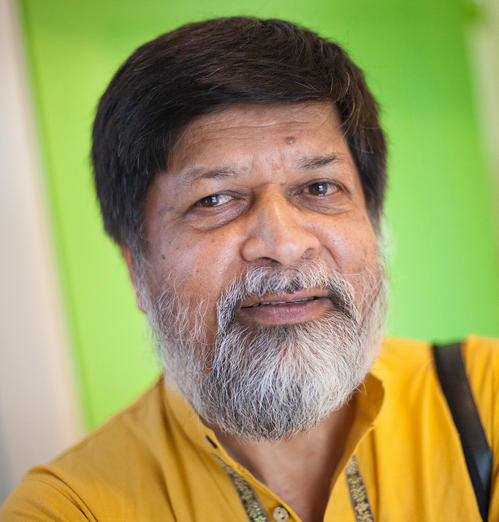Subscribe to ShahidulNews
PopTech 2011 Interview: Shahidul Alam on photography for change
Lindsay Borthwick?(?BIO / ??POSTS )??|??Friday, October 21, 2011 UTC
?
Shahidul Alam walked on stage on Thursday wearing a marigold-colored salwar kameez, a camera over his left shoulder, and a beltpack slung around his hips. There was no mistaking his calling. The Bangladeshi photographer, activist and social entrepreneur has almost single-handedly rebalanced the world of photojournalism, long dominated by Western photographers and their worldview. He has shifted its lens eastward and southward by training legions of photographers in his homeland, creating an award-winning photo agency to sell their work and founding a prestigious international photography festival to showcase their talent. And this fall, he published a book,?My Journey as a Witness, telling the story of Bangladeshi photography as an instrument of social justice. He serves as an ambassador of this movement, in the words of PopTech?s executive director, Andrew Zolli, ?travelling the world leaving new cultures of art makers in his wake.? We sat down with Alam backstage in Camden, Maine.
PopTech: You founded?Drik, a photo agency, and the?Chobi MelaInternational Festival of Photography. Why did you feel it was important for Bangladeshi photographers, as well as their peers, to have these outlets for their work?
Shahidul Alam: Firstly, it was a question of addressing this very distorted perception people have of what I call the ?majority world? countries. Our poverty is a reality, but that is not the only identity that we have. Secondly, I wanted to challenge a very unidirectional form of storytelling that has — to a large extent — been propagated by the West. The richness and diversity of human life gets lost in a very agenda-led information distribution system. So that was the beginning.
We also wanted to celebrate our own culture. It?s not that I am against white, Western photographers producing work in Bangladesh — I think our ideas need to be challenged just as much. It?s the monopoly of dissemination that I was against. So we wanted to create a space for diversity — for both Western work and our own work. That?s where the Chobi Mela festival came in — to facilitate that cultural infusion.
Continue reading “PopTech 2011 Interview:”
